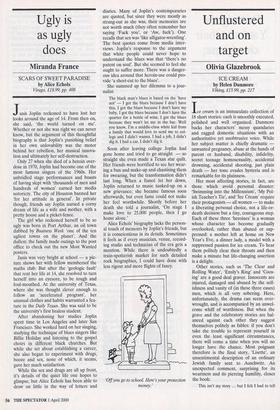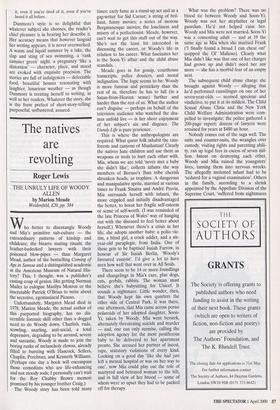Unflustered and on target
Olivia Glazebrook
ICE CREAM by Helen Dunmore Viking £15.99, pp. 217 Ice cream is an immaculate collection of 18 short stories: each is smoothly executed, polished and well organised. Dunmore backs her characters' messy quandaries and ragged domestic situations with an authoritative yet unobtrusive voice. While her subject matter is chiefly dramatic unwanted pregnancy, abuse at the hands of parent or husband, disability, infidelity, secret teenage homosexuality, accidental drowning, accidental shooting, just plain death — her tone evades hysteria and is remarkable for its plainness.
Her most affecting stories, in fact, are those which avoid personal disaster: `Swimming into the Millennium', `My Pol- ish Teacher's Tie', and 'Ice Cream' require their protagonists — all women — to make a liberating personal choice, not a life-or- death decision but a tiny, courageous step. Each of these three 'heroines' is a woman whose character has become gradually overlooked, rather than abused or sup- pressed: a mother left at home on New Year's Eve, a dinner lady, a model with a suppressed passion for ice cream. To hear them politely clear their throats and then make a minute but life-changing assertion is a delight.
Other stories, such as 'The Clear and Rolling Water', 'Emily's Ring' and 'Coos- frig' are a good deal graver. Innocents are injured, damaged and abused by the self- ishness and vanity of (in these three cases) men, which is all very sobering. Here, unfortunately, the drama can seem over- wrought, and is accompanied by an unwel- come whiff of worthiness. But when the grave and the celebratory stories are bal- anced against each other they suggest themselves politely as fables: if you don't take the trouble to represent yourself in even the least significant circumstances, there will come a time when you will no longer have the chance. Most poignant therefore is the final story, 'Lisette', an unsentimental description of an ordinary Jewish family sent to Auschwitz. An unexpected comment, surprising for its weariness and its piercing humility, closes the book: This isn't my story ... but I felt I had to tell
it, even if you're tired of it, even if you've heard it all before.
Dunmore's style is so delightful that whatever subject she chooses, the reader's chief pleasure is in hearing her describe it. Her accuracy means that however languid her writing appears, it is never overworked. A warm and liquid summer by a lake, the slap and sting of sea swimming, a 'rank summer green' night, a pregnancy 'like a distortion' — character, place, and mood are evoked with exquisite precision. The stories are full of indulgences — delectable food, beautiful houses resonating with laughter, luxurious weather — as though Dunmore is treating herself to writing, as well as her readers. Whatever the story, she is the form prefect of short-story-telling: purposeful, unflustered, assured.























































































 Previous page
Previous page